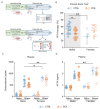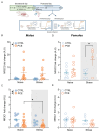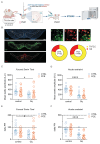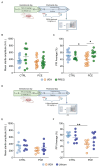Sex-specific maladaptive responses to acute stress upon in utero THC exposure are mediated by dopamine
- PMID: 39622370
- PMCID: PMC7617568
- DOI: 10.1016/j.phrs.2024.107536
Sex-specific maladaptive responses to acute stress upon in utero THC exposure are mediated by dopamine
Erratum in
-
Corrigendum to "Sex-specific maladaptive responses to acute stress upon in utero THC exposure are mediated by dopamine" [Pharmacol. Res. 210 (2024) 107536].Pharmacol Res. 2025 Aug;218:107828. doi: 10.1016/j.phrs.2025.107828. Epub 2025 Jun 18. Pharmacol Res. 2025. PMID: 40537305 No abstract available.
Abstract
Cannabis remains by far the most consumed illicit drug in Europe. The availability of more potent cannabis has raised concerns regarding the enhanced health risks associated with its use, particularly among pregnant women. Growing evidence shows that cannabis use during pregnancy increases the risks of child psychopathology. We have previously shown that only male rat offspring prenatally exposed to Δ9-tetrahydrocannabinol (THC), a rat model of prenatal cannabinoid exposure (PCE), display a hyperdopaminergic phenotype associated with a differential susceptibility to acute THC- and stress-mediated effects on sensorimotor gating functions. Here, we explore the contribution of the hypothalamic-pituitary-adrenal (HPA) axis, key regulator of body adaptive stress responses, to the detrimental effects of acute stress on ventral tegmental area (VTA) dopamine neurons and sensorimotor gating function of PCE rats. We report a sex-dependent compromised balance in mRNA levels of genes encoding mineralocorticoid and glucocorticoid receptors in the VTA, alongside with stress-induced pre-pulse inhibition (PPI) impairment. Notably, VTA dopamine neuronal activity is causally linked to the manifestation of stress-dependent deterioration of PPI. Finally, pharmacological manipulations targeting glycogen-synthase-kinase-3-β signaling during postnatal development correct these stress-induced, sex-specific and dopamine-dependent disruption of PPI. Collectively, these results highlight the critical sex-dependent interplay between HPA axis and dopamine system in the regulation of sensorimotor gating functions in rats.
Keywords: Cannabis; DREADD; Dopamine; HPA axis; Neurodevelopment; Psychopathology; Stress; vulnerability.
Copyright © 2024 The Authors. Published by Elsevier Ltd.. All rights reserved.
Conflict of interest statement
Declaration of Competing Interest The authors also declare no competing personal or financial interests.
Figures





References
-
- GBD 2017 Disease and Injury Incidence and Prevalence Collaborators. Global, regional, and national incidence, prevalence, and years lived with disability for 354 diseases and injuries for 195 countries and territories, 1990–2017: a systematic analysis for the Global Burden of Disease Study 2017. The Lancet. 2018 doi: 10.1016/S0140-6736(18)32279-7. - DOI - PMC - PubMed
-
- Solmi M, Radua J, Olivola M, Croce E, Soardo L, Salazar de Pablo G, Il Shin J, Kirkbride JB, Jones P, Kim JH, Kim JY, et al. Age at onset of mental disorders worldwide: large-scale meta-analysis of 192 epidemiological studies. Mol Psychiatry. 2022;27(1):281–295. doi: 10.1038/s41380-021-01161-7. - DOI - PMC - PubMed
-
- Caspi A, Houts RM, Ambler A, Danese A, Elliott ML, Hariri A, Harrington H, Hogan S, Poulton R, Ramrakha S, Rasmussen LJH, et al. Longitudinal assessment of mental health disorders and comorbidities across 4 decades among participants in the dunedin birth cohort study. JAMA Netw Open. 2020;3(4):e203221. doi: 10.1001/jamanetworkopen.2020.3221. - DOI - PMC - PubMed
-
- WH. Organization. The World Health Report: 2001: mental health: new understanding. New Hope World Health Organization. 2001
-
- Pereira-Figueiredo I, Umeoka E. Stress: influences and determinants of psychopathology. Encyclopedia. 2024;4(2):1026–1043.
MeSH terms
Substances
Grants and funding
LinkOut - more resources
Full Text Sources
Medical

